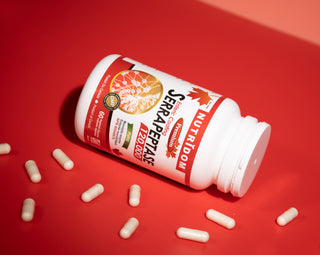What Is Serrapeptase?
Serrapeptase is a proteolytic enzyme in the trypsin family. Another name for serrapeptase is serratiopeptidase. Like other proteolytic enzymes, serrapeptase helps break down proteins into smaller molecules. It can promote healing by reducing fluid and debris accumulation that can occur around tissue when an injury takes place. Today, serrapeptase is mostly isolated from the non-pathogenic bacteria called Serratia E15, which is found in silkworms. In the 1980s and ’90s, when Japanese and European researchers compared several enzymes for potential anti-inflammatory activity, they found that serrapeptase was the highly effective at controlling the body’s inflammatory response.
Benefits of Serrapeptase
Modulating Pain and Inflammation
One of the main benefits of serrapeptase is helping to reduce pain. However, serrapeptase works quite differently from other anti-inflammatories. Researchers think that enzymes like serrapeptase work to reduce inflammation by facilitating immune cell movement and regulating levels of lymphocytes at the site of inflammation. This enzyme seems to work in part by breaking down cyclooxygenase. Cyclooxygenase is an enzyme responsible for producing different inflammatory molecules. It can also reduce pain by blocking the release of bradykinin in damaged tissue, which leads to a pain response. One study looked at the effects of serrapeptase in a group of participants and they found that they had significant reductions in pain severity and mucus production compared to those who took a placebo. These studies demonstrated that serrapeptase may offer pain relief for people with certain inflammatory ear, nose, and throat conditions.
Infections and Wound Healing
Serrapeptase has been shown to help prevent infections, and assist with wound healing. This is thought to be due to the caseinolytic properties of serrapeptase. Thereby promoting recovery from infections and injuries because it’s been shown to:
- decrease swelling
- reduce formation of scar tissue
- reduce excess mucus
- break down excess proteins
- decrease permeability of capillaries (small blood vessels)
- control histamine responses
- control skin temperature
- facilitate the absorption of decomposed products through blood and the lymphatic system
- inhibit the formation of biofilm
Several other studies and reviews have suggested that serrapeptase in combination with antibiotics may be a good strategy to reduce or stop the progression of infection — especially from antibiotic-resistant bacteria. An additional benefit of serrapeptase may increase the clearance of mucus and reduce inflammation in the lungs in people with chronic respiratory issues. Particularly chronic lung issues that lead to coughing and difficulty breathing due to the overproduction of mucus.
Who Should Use Serrapeptase?
Research to date shows that serrepeptase is generally well-tolerated by adults. However, more research is still needed to show its long-term safety. When taken orally, serrapeptase is easily destroyed and deactivated by your stomach acid before it has a chance to reach your intestines to be absorbed. For this reason, dietary supplements containing serrapeptase should be enteric-coated, which prevents them from being dissolved in the stomach and allows for release in the intestine. The recommendation generally is to take serrapeptase on an empty stomach or at least 30 mins before eating or two hours after finishing a meal. The doses typically used in studies range from 10 mg to 60 mg per day. The enzymatic activity of serrapeptase is measured in units, with 10 mg equaling 20,000 units of enzyme activity.
What are the potential side effects of taking Serrapeptase?
Possible serrapeptase side effects may include:
- Digestive upset, including nausea
- Skin inflammation and spreading of infections or rash
- Muscle aches and joint pain
- Increased risk for pneumonia
- Potentially increased risk for infections, such as bladder infection
- Potentially increased risk for bleeding and bruising, especially when combined with drugs such as warfarin, clopidogrel and aspirin
As with many supplements, checking with your healthcare provider can help you decide if serrapeptase is the right fit for you.


Alexandru Nitu
Hi,
Is this similar acting like N-STRIDE?
Thank you